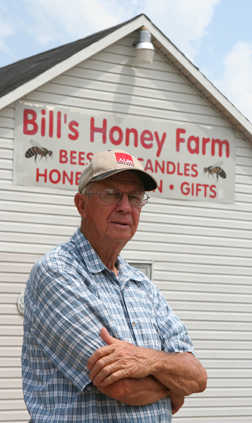BEE ATTITUDES: Alabama Buzzing With Interest In Beekeeping Again

He was her honey, and she was his queen. So when Jimmy Carmack and LindaKaye Ellis tied the knot, they did so while wearing their beekeeper suits.”She says she’s probably the only bride that had to unzip and pull back her husband’s veil,” Jimmy says with a sheepish grin. “Of course, she gets to wear her wedding outfit over and over.”That’s because more than four years after their marriage during the American Beekeeper Federation’s annual convention in Reno, Nev., the Carmacks are still sweet on each other and on honeybees, tending about 100 hives at locations as far north as Huntsville and as far south as Mobile.Together, they are among more than 900 registered beekeepers (and countless unregistered ones) in Alabama. Dennis Barclift, the state apiarist with the Alabama Department of Agriculture and Industries, says that figure will likely grow significantly once the new registration period is tallied.In fact, as September ushers in National Honey Month, the state is experiencing a beekeeping resurgence unlike any Carmack has seen since ordering his first bees from Sears & Roebuck in 1973.”There’s been such a big resurgence that the people who sell bee equipment are actually running out of supplies because so much is being ordered,” says Carmack, adding that beginner beekeeper kits are available for as little as $200.”The interest in beekeeping — and honey sales — have just gone through the roof in the last few years. It seems like everybody is buying honey now,” says Bill Mullins of Madison County, chairman of the Alabama Farmers Federation’s State Bee & Honey Committee who sells as much as 12,000 pounds of honey a year at farmers markets, restaurants, chiropractor offices and even a barber shop.Barclift attributes the resurgence to a change in mindset — the public’s bee attitudes, if you will — about beekeeping. “I’ve probably gotten four times the number of calls I got three years ago,” he said. “People are going back to nature, going green, drinking organic milk, eating raw honey … it’s going back to the basics.”Carmack and Mullins, however, believe the renewal is partially due to the public’s misconception about Colony Collapse Disorder, a phenomenon in which bees abruptly — and inexplicably — vanish from the hive. Barclift says the state has not had a single verifiable case of CCD.”Alabama doesn’t officially have CCD, but everybody is hearing that the bees are dying and they want to help by becoming beekeepers,” Carmack explains.That’s why, Mullins says, beekeeping classes in Madison County now draw as many as 80 people with 10 to 20 percent of those actually beginning their own hives. “People became more aware of bees and what the benefits are,” he said.David Ellis can vouch for that. Ellis, president of the Alabama Beekeepers Association, teaches a seven-week beekeeping class at Birmingham Botanical Gardens, beginning each February. The last one drew more than 100.”In the past three years we-ve more than doubled the enrollment in the state association,” Ellis said. “We were just sort of hanging on, and then, all of a sudden, it just took off. I think a lot of that is attributable to the beekeeping schools. When I got started in beekeeping 12 years ago, I would’ve been 37 or 38 years old. I was like a kid — everybody was 55 or older. Now we are seeing some younger ones coming along, but the biggest increase I’ve seen is in women.”Whatever the reason, beekeepers like the Carmacks, Mullins and Ellis are glad to see it happen — not only because of increased honey sales, but also because of bees’ important role in pollinating a third of the world’s food supply.”Ellis, for example, placed several hives in a 25-acre watermelon field this summer at the request of a couple of farmers. “You can only keep so many beehives in one place,” Ellis explained. “You get too many hives and it gets adulterated. So I need places to put them and small fields like this are a good thing for me. It helps these guys because they need the bees, and it helps me, too.”What’s more, the presence of European honeybees is regarded as the best defense against the dreaded Africanized honeybees (AHB) that have created havoc in Florida where stinging attacks are reported almost daily. “European honeybees will sting and attack for 30 minutes and then go back home; Africanized honeybees will attack until there is nothing left to attack,” said Barclift, adding that the Africanized bees are so viciously defensive that they have been known to chase their prey for more than a mile.But fear over AHB has prompted officials in some communities to ban beekeeping. “Florida’s apiarist says his primary job now is to fight ordinances against beekeeping,” said Barclift. “He said he stays busy trying to keep beekeeping legal in Florida.”Legislating beekeepers out of a community is “the worst thing they can do,” says Carmack, who maintains hives within the city limits of Center Point. “It’s like taking the police out of an area — you’ve just opened it up to the robbers and the bad people. So long as beekeepers have managed colonies that are kept Africanized-free, that puts pressure on the African bees — it gives them a reason NOT to take over an area.”Of course, the more European bees the better as far as Carmack’s concerned — after all, that’s how he found his “honey” in LindaKaye.He still grins when he talks about their wedding. “She tells people that she’s a little perturbed that it was my idea,” he says. “But she was willing to go along with just about anything as long as it didn’t involve jumping out of an airplane or an Elvis impersonator marrying us.”
